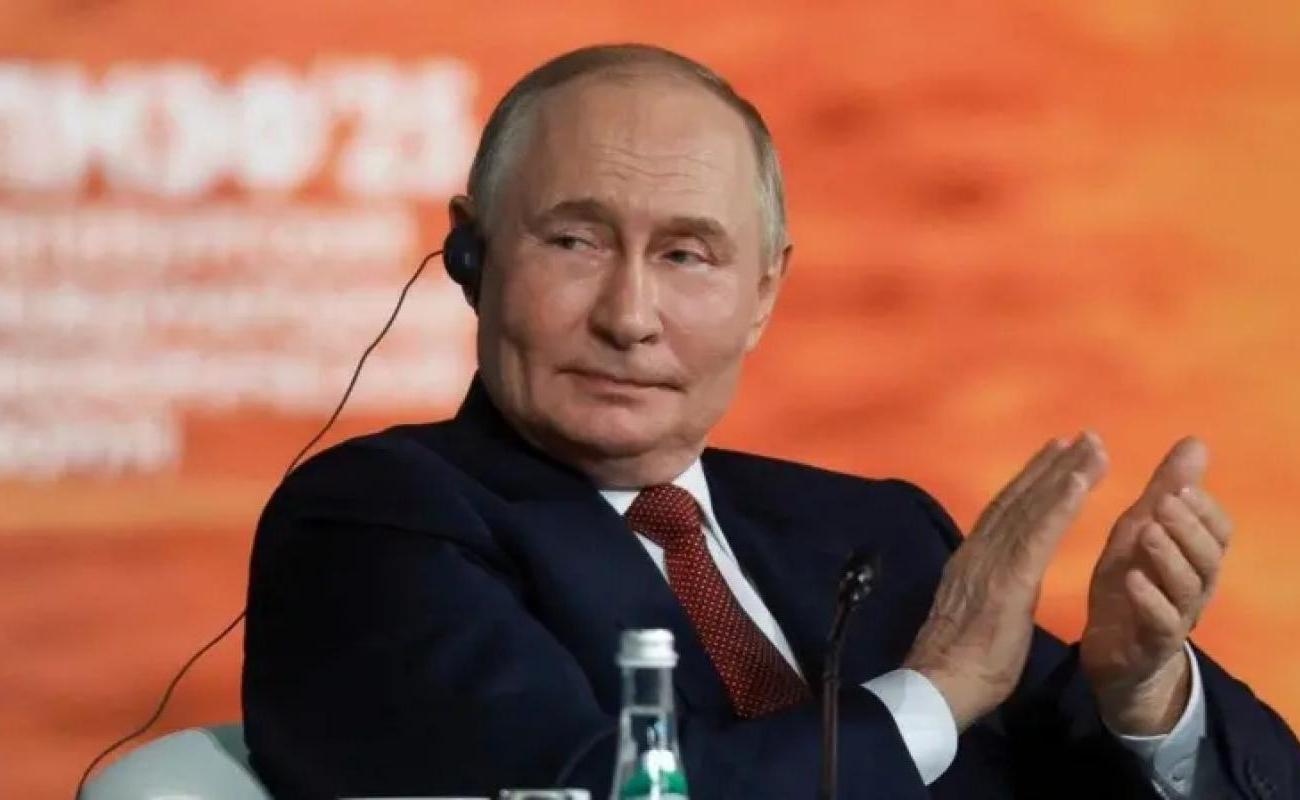'Wherever a Russian soldier steps, it's ours'

Russian President Vladimir Putin has said that the Russian military "does not have the task of taking Sumy," but he did not rule out occupying the northeastern Ukrainian city in the future.
"We do not have the goal of taking Sumy, but in principle I do not rule it out," Putin said at the St. Petersburg International Economic Forum, responding to a question about creating a "security zone" in the Sumy region.
He said the Russian military was "forced to create a security zone along the border" after Ukrainian forces invaded Kursk Oblast, a Russian border region, in August 2024.
Asked about the length of the "security zone" that Russia intends to create in Ukraine, Putin replied: "In the Sumy region, the depth is somewhere between 10 and 12 kilometers, somewhere around 8, 10, 12 kilometers. Then there is the city of Sumy, the regional center."
"Wherever a Russian soldier steps, it is ours," Putin said, commenting on the advance of Russian troops in Ukraine.
Putin has reiterated that he considers the Russian and Ukrainian peoples to be one people.
"In that sense, all of Ukraine is ours," he said.
Russia currently controls about a fifth of Ukraine, including the Crimean peninsula it annexed in 2014, almost all of Luhansk Oblast, more than 70 percent of Donetsk, Zaporizhia and Kherson Oblasts, as well as parts of Kharkiv, Sumy and Dnipropetrovsk Oblasts.
Putin said Russia does not want Ukraine to capitulate, but to accept the reality on the ground, which means recognizing as Russian occupied Ukrainian territory - larger than the US state of Virginia, Reuters reported.
Ukrainian Foreign Minister Andriy Sibiga reacted to Putin's statement on June 20.
"Putin's cynical statement shows complete disrespect for US peace efforts.
"As America and other countries around the world call for an immediate end to the killing, Russia's top war criminal is considering plans to seize more Ukrainian territory and kill more Ukrainians," wrote Sibiga on the X network.
"But of all Putin's crazy statements, his words about the Russian boot stand out.
"In reality, wherever the Russian soldier steps, he brings only death, destruction and desolation."
Buffer zone
At a meeting with government officials on May 22, Putin announced a decision to create a security buffer zone along the border with Ukraine to protect Russian regions from threats from Ukrainian armed forces.
He first spoke about such plans in March 2024.
In late May, Ukrainian President Volodymyr Zelensky said that Russia was massing troops in the direction of Sumy to create a 10-kilometer-deep "buffer zone."
He estimated that the Russian group preparing for the offensive numbered more than 50,000 people.
In early June, military analysts noted that the Russian army was intensifying its offensive in the Sumy region, which began in early spring.
According to military experts, by early June, Russian troops were 20-25 kilometers from the outskirts of Sumy.
The Russian army entered the border areas of the Sumy region of Ukraine in late winter.
While conducting an operation to push Ukrainian troops out of the Kursk region, they crossed the border near the village of Novenkoye and began to push their way to the Sumy-Sudzha highway.
It was the main logistical artery of the Ukrainian armed forces on this section of the front.
In early June, NATO announced that it was closely monitoring the accumulation of Russian units near the border with the Sumy region and military actions that had moved from the Kursk region to the border villages of the Sumy region.
At the same time, experts from the American Institute for the Study of War (ISW) had previously said that the Russian army may have a goal of capturing Sumy, but, in their opinion, Russian troops would not be able to achieve this in the near future.
"We continue to consider it unlikely that Russian forces will be able to capture the city of Sumy in the near or medium term, as they have not captured any Ukrainian city with a pre-war population of more than 100,000 since July 2022," the Institute for the Study of War said in a June report.
